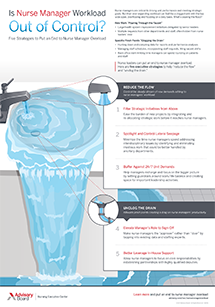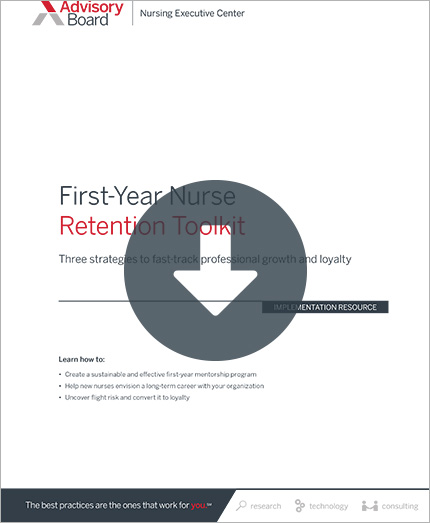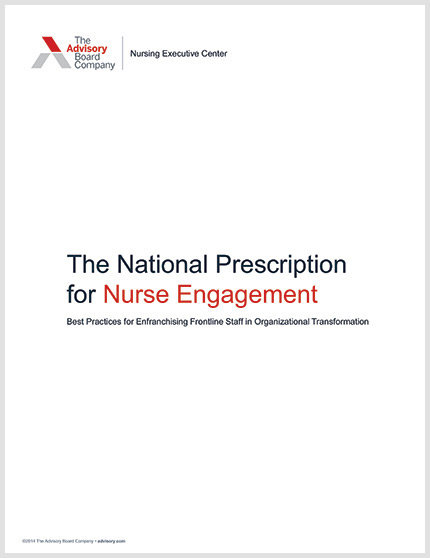Auto logout in seconds.
Continue LogoutWhile the overwhelming majority of nurses said they are glad they became nurses, about one in five said they would opt for a different career if they had to do it over again, according to Medscape's annual Nurse Career Satisfaction Report.
Get the national prescription for nurse engagement
For the report, Medscape surveyed 10,523 nurses on their opinions about their careers. Respondents included licensed practicing nurses (LPNs); RNs; and advanced practice registered nurses (APRNs), such as NPs, nurse midwives (NMs), clinical nurse specialists (CNSs), and certified registered nurse anesthetists (CRNAs).
Some nurses would pick a different career
Between 95% and 98% of respondents, depending on type of nurse, said they were glad they became nurses. However, when asked if they would pick the same career again, about 20% of nurses across the groups said they would select a different job, including:
- 15% of CNSs;
- 17% of RNs;
- 18% of NMs;
- 18% of NPs;
- 20% of CRNAs; and
- 21% of LPNs.
Among RNs, the survey found male nurses (27%) were more likely than female nurses (21%) to say they would have chosen a different career.
The survey also found that between 29% to 41% of nurses, depending on group, said while they would have selected nursing again as an occupation, they would have opted for a different practice setting. Overall, CNSs and NMs were the most likely to say they would have selected a different practice setting.
Best part of the job
Respondents cited several rewarding aspects of their job, with about 40% of RNs and LPNs listing "helping people/making a difference in people's lives" as the most rewarding part of their work. A slightly higher percentage of most ARPNS—47% of CNSs, 49% of NMs, and 46% of NPs—cited "helping people" as a rewarding part of their job, with CRNAs being the only exception at 23%. Among CRNAs, being in a job they liked (29%) was most commonly cited as the most rewarding part of their work.
Nurses' earnings were the least likely to be cited as the most rewarding part of the work, survey found. Between 1% to 4% of LPNs, RNs, and APRNs cited it as a factor. That said, an increasing number of respondents in this year's survey said a flexible work-life schedule was important, citing flexible hours, work-from-home arrangements, and "having a job that fits my lifestyle" as rewarding factors.
Least satisfying part of the job
On the flip side, the most commonly cited "least satisfying aspect of [the] job" among nurses generally was administration and workplace politics, as cited by 20% of NMs, 23% of LPNs, 28% of RNs, 30% of CNSs, and 33% of CRNAs. In comparison, NPs (27%) most frequently cited documentation requirements as the least satisfying aspect of their job.
A significant proportion of nurses also cited a lack of respect from doctors, supervisors, peers, and colleagues as the least satisfactory aspect of their job, including:
- 7% of RNs;
- 7% of CNSs;
- 7% NPs;
- 9% of LPNs;
- 12% of NMs; and
- 18% of CRNAs.
Among nurses who said they were dissatisfied with their work, most said they would seek out early retirement or explore a different path in the nursing field. Specifically, depending on specialty, between 6% and 24% of nurses said they would pursue a new path in the nursing field and between 13% and 28% said they would consider early retirement (Ault, Medscape, 12/13; Knowles, Becker's Hospital Review, 12/13; Medscape Nurse Career Satisfaction Report 2017, 12/13).
Get the national prescription for nurse engagement
It's more important than ever for frontline nurses to be engaged in their work, committed to their organization's mission, and capable of delivering high-quality care in a complex and constantly changing environment.
This report identifies the unique challenges of engaging nurses and equips nurse leaders with five strategies for building a highly engaged workforce.
Don't miss out on the latest Advisory Board insights
Create your free account to access 1 resource, including the latest research and webinars.
Want access without creating an account?
You have 1 free members-only resource remaining this month.
1 free members-only resources remaining
1 free members-only resources remaining
You've reached your limit of free insights
Become a member to access all of Advisory Board's resources, events, and experts
Never miss out on the latest innovative health care content tailored to you.
Benefits include:
You've reached your limit of free insights
Become a member to access all of Advisory Board's resources, events, and experts
Never miss out on the latest innovative health care content tailored to you.
Benefits include:
This content is available through your Curated Research partnership with Advisory Board. Click on ‘view this resource’ to read the full piece
Email ask@advisory.com to learn more
Click on ‘Become a Member’ to learn about the benefits of a Full-Access partnership with Advisory Board
Never miss out on the latest innovative health care content tailored to you.
Benefits Include:
This is for members only. Learn more.
Click on ‘Become a Member’ to learn about the benefits of a Full-Access partnership with Advisory Board
Never miss out on the latest innovative health care content tailored to you.



